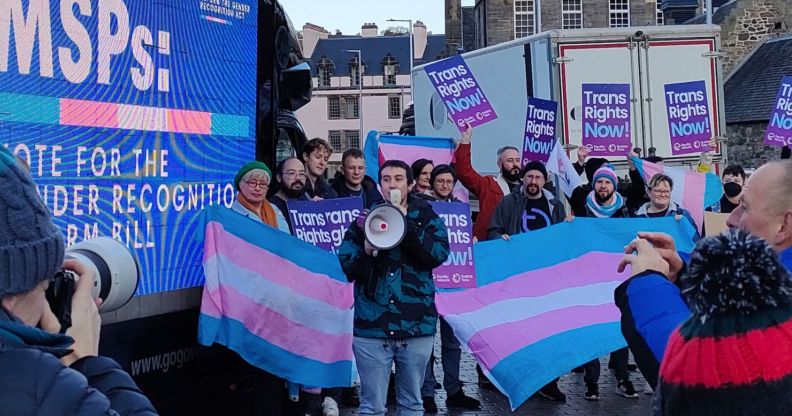Tory government suggests it could block Scottish gender reform from Royal Assent

Advocates called on Holyrood to pass the Gender Recognition Reform (Scotland) bill, which would streamline the process by which trans people can live as their authentic selves. (Scottish Trans/Equality Network)
Tory Scottish secretary Alister Jack has warned he could seek to block Scotland’s gender recognition reforms from gaining Royal Assent.
The Scottish Parliament voted through its Gender Recognition Reform bill on Thursday (22 December) by 86 to 39. The bill will allow trans people to access Gender Recognition Certificates (which amend the sex on a person’s birth certificate) without the need for medical diagnosis, and will lower the age limit to 16.
Like all laws approved by parliaments, it must now be given Royal Assent by the King.
While this is usually mere formality, Westminster’s Scottish secretary has warned he could try to prevent it.
“We share the concerns that many people have regarding certain aspects of this bill, and in particular the safety issues for women and children,” Jack said in a statement seen by PinkNews.
“We will look closely at that, and also the ramifications for the 2010 Equality Act and other UK-wide legislation, in the coming weeks – up to and including a Section 35 order stopping the bill going for Royal Assent if necessary.”
Section 35 of the Scotland Act 1998 gives the UK government the power to intervene on bills “which the secretary of state has reasonable grounds to believe would be incompatible with any international obligations or the interests of defence or national security, or which make modifications of the law as it applies to reserved matters and which the secretary of state has reasonable grounds to believe would have an adverse effect on the operation of the law as it applies to reserved matters”.
If a Section 35 order was sought, it would represent a first.
The Scottish government has made clear the Gender Recognition Reform Bill does not change the Equality Act 2010 or impact access to single-sex spaces (trans people’s access to such spaces isn’t dependant on a GRC).
Scotland’s justice secretary Shona Robison said during the final debate: “Trans rights are not in competition with women’s rights, and as so often before, we can improve things for everyone when those discriminated against act as allies, not opponents.”
Any attempts by the UK government to stymie the bill would inflame tensions between the SNP and the Tories – the SNP is already pushing for a second independence referendum.
The Scottish Parliament passed the bill a day later than expected after the Scottish Tories were accused of “shamelessly filibustering” proceedings and “wasting time” attempting to table last-minute amendments.
Proceedings on both Tuesday (20 December) and Wednesday (21 December) reportedly went on past midnight due to delays.
The legislation, which passed its first vote on 27 October, would amend the Gender Recognition Act 2004 to lower the age limit to apply for a Gender Recognition Certificate (GRC) from 18 to 16, and shorten the period a trans person would have to wait before legally changing their gender (three months for those over 18, six months for those under).
Trans people would also be able to gain legal recognition without being required to get medical reports or a diagnosis in order to obtain a GRC.
Under current legislation, trans people must apply to a UK gender recognition panel and present reports as well as a diagnosis of gender dysphoria – a process that can take years given the immense wait times at NHS gender clinics.
Stonewall director of nations Colin MacFarlane called Thursday’s vote a “tremendous step forward for trans rights”.
“It brings Scotland into line with international best practice and once again establishes itself as a world leader on human rights, by making a small change which brings dignity to trans people who deserve to be legally recognised for who they are,” MacFarlane added.
“The UK government must now follow and introduce legislation to ensure that trans people UK-wide have access to the same standards of human rights.”
The Scottish Greens said: “This is a small but significant change that will make a big difference. It’s truly historic day for equality.”

